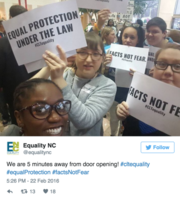What do Supreme Court and the North Carolina legislature have to do with an Easter egg? More than you think.
On Wednesday, the Supreme Court heard oral arguments for a case called Zubik v. Burwell, another case challenging the Affordable Care Act requirement that employers provide insurance coverage for contraception to their employees. The Obama administration has created a work-around for religious groups with objections to the mandate: mail in a simple form or letter, and the government takes on the responsibility of ensuring that women get their coverage through a third-party insurer.
But now, several dozen religiously-affiliated nonprofit employers are arguing that even filing the form violates their religious freedom.
If the plaintiffs in the case win, hundreds of thousands of women could lose insurance coverage for contraceptives. This would include students, faculty, and workers at religiously-affiliated schools, universities and hospital systems. If their employers or schools decide they object to providing contraceptive coverage based on their religious beliefs, employees and students are stuck paying out of pocket.
The pill alone can cost up to $600 per year. Staying financially afloat is already a struggle for many working families, and being able to decide whether or when to get pregnant is crucial for the financial stability of all Americans. Not to mention the fact that basic reproductive healthcare, including contraceptives, can make an enormous difference in a woman's overall health. For some women, access to contraceptives is literally a matter of life and death.
The plaintiffs in Zubik may be the latest to try denying critical healthcare to women and their families in the name of religion. But for me, an ordained United Methodist minister and occasional theology professor and preacher, I cannot help but think first of the women who struggle every day to keep themselves and their families healthy in lean financial times. The women for whom an unplanned pregnancy could mean a lost job, physical risk or devastating financial expense.
Right now, as Christians around the world celebrate Holy Week, we must remember that the Christ story reminds us to look for God first among those on the margins. Holy Week should challenge the idea that many people of faith can uncritically support a notion of "religious liberty" that results in deep harm to those whose livelihoods are already vulnerable, whose lives are already precarious.
That's also why my faith tells me that God is likely hanging out in North Carolina, where this week the state legislature has called a special session -- at a cost of $42,000 per day -- for the express purpose of overriding a Charlotte non-discrimination ordinance. The city ordinance ensures that folks in need of a restroom can perform this basic human need in dignity and privacy regardless of sexual orientation or gender identity. It would also prevent business owners from refusing service to LGBT customers -- a protection against discrimination that 64 percent of North Carolinians already support.
I believe the faith of the Zubik plaintiffs is real, but I also believe that the God of Holy Week also calls us to stand for justice for the vulnerable women and their families who would be harmed by a ruling for the plaintiffs in Zubik. Likewise, this God that Christians meet beyond the cross on Easter leads me to hope that the Charlotte non-discrimination ordinance stands despite the best efforts of hateful and fearful political opposition, for it affirms that all persons are worthy of dignity and justice in a community.
Despite nasty efforts to legislate discrimination and stand between women and the basic healthcare they need -- in the name of religion, no less -- the persistent hope of Easter threads itself in and through this especially contentious Holy Week.
Along the way towards Easter, Christians walk with Jesus as he is put on trial and executed for being a radical. Christ pointed followers to a God of Hope -- for inclusion, for dignity, for whole and healthy bodies. After Christ's death comes resurrection -- the ultimate assurance that justice and mercy win.
Oh, and that Easter egg? It's an ancient symbol of fertility. Easter eggs signal new life after a long winter. It is not too late for our own lawmakers, leaders, and jurists to renew their own hope in justice and mercy for the marginalized and vulnerable among us.
Follow Carolyn Davis on Twitter at @carojdavis.
